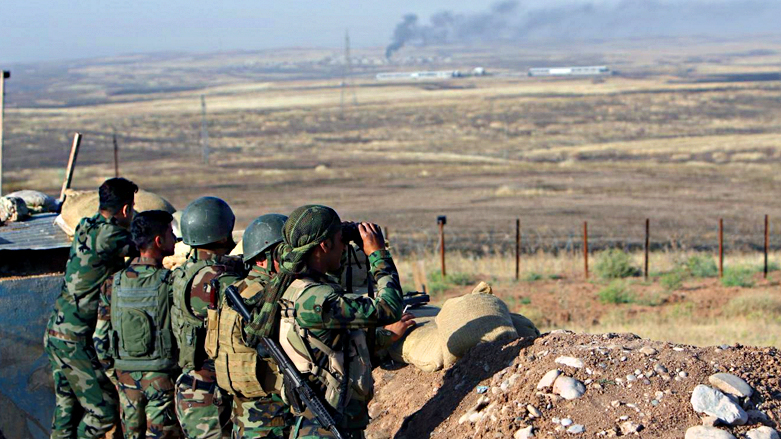Senior Peshmerga leader says 10 ISIS fighters killed in Coalition airstrikes near Makhmour

ERBIL (Kurdistan 24) – General Sirwan Barzani, the Peshmerga Commander at the Gwer-Makhmour front line, told Kurdistan 24 on Tuesday that Coalition planes killed at least 10 Islamic State fighters on the Gwer-Makhmour border.
According to General Barzani, the terrorists were hiding in areas disputed between Iraqi security forces and the Kurdistan Region’s Peshmerga.
The Peshmerga Commander added that heavy bombardments have also been carried out by coalition planes against Islamic State positions in the last few days. In these bombings, many tunnels and hideouts the militants used were destroyed, Barzani revealed.
In early November, Commander Barzani announced that the Coalition and Peshmerga forces had carried out joint operations against members of the so-called Islamic State southwest of the Kurdistan Region capital of Erbil in the Qarachukh Mountain.
Read More: Coalition and Kurdish forces conduct anti-ISIS operation in Iraq’s disputed Makhmour
Following the emergence of the Islamic State in 2014 throughout most of the disputed areas, the Kurdish Peshmerga forces held their frontlines and prevented sleeper cells from entering their territory despite the terrorist organization controlling adjacent land.
Security in those regions, however, significantly deteriorated after Iraqi forces and Iranian-backed Shia militias overran Kirkuk and other disputed territories and drove Kurdish forces out in response to the Kurdistan Region’s September 2017 independence referendum.
One day after Iraqi forces took over Kirkuk, Peshmerga forces withdrew on Oct. 17, 2017, from Makhmour and Gwer, towns south of Erbil.
Since Shia militias entered Makhmour, Islamic State fighters have returned close to the region, threatening local villagers and farmers, over three years after the central government in Baghdad declared a military victory over the group in late 2017.
Last year, General Barzani told Kurdistan 24 that areas “under the control of Iraqi forces do not have enough of a presence to prevent ISIS from accessing the Qarachukh Mountain.”
In response to the Islamic State threats, the Peshmerga forces and Iraqi troops, backed by US-led Coalition airpower, have launched several military operations to eliminate sleeper cells hiding in areas surrounding Mount Qarachukh.
Last week, the Pentagon’s Inspector General (IG) issued a report that suggested the Islamic State is taking advantage of the unresolved territorial dispute between the Iraqi central government and the Kurdistan Regional Government (KRG).
The report said the US Defense Intelligence Agency (DIA) stated that “ISIS successfully operates in these gaps because of the lack of security coordination and intelligence sharing between the Peshmerga and ISF (Iraqi Security Forces).”
The DIA report also said the terror group has exploited the rugged terrain of the Hamrin, Qarachukh, and Makhmour Mountains to hide and evade counter-terrorism forces.
It should be noted that senior Kurdistan Region leaders, including Prime Minister Masrour Barzani and his cabinet, have made numerous strides to resolve outstanding issues between Erbil and Baghdad, including further security cooperation in disputed areas.
Editing by Karzan Sulaivany
